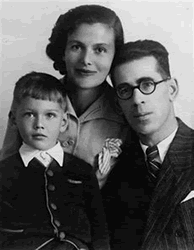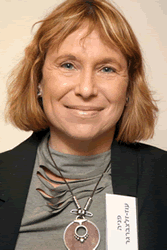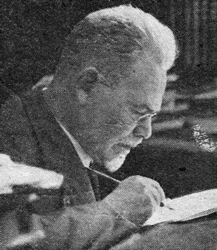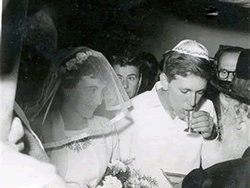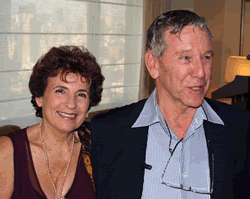The Klausner family of the Vilna region
Many of the Klausner family members seem to originate in the Trakai district,very near Vilna.
To check some of the family tree go to: http://www.geni.com/people/Yehezkel-Klausner/6000000009478989213?through=6000000009430286188#/tab/overview
Joseph Gedaliah Klausner (1958–1874), was a Jewish historian and professor of Hebrew Literature. He was the chief redactor of The Hebrew Encyclopedia.
Klausner was born in Olkeniki/ Valkininkai (30 miles southwest of Vilnius, in the Trakai district, Vilnius gubernia, now in Lithuania) in 1874. At the turn of the 20th century, his family left Lithuania due to growing antisemitism and settled in Odessa, where Klausner was educated. He frequented scientific, literary, and Zionist circles. Klausner was a committed Zionist, and knew Theodore Herzl personally.
In 1912, he visited Palestine for the first time, and moved there in 1919. In 1925, he became a professor of Hebrew literature at the University of Jerusalem. He embarked upon research on the history of the Second Temple period. According to his great-nephew, Amos Oz, his private library contained 25,000 volumes. Later in his career, he was given a chair in Jewish history.
His house in Talpiot was virtually destroyed in the 1929 Palestine riots. Amos Oz wrote about his great uncle in his autobiography, "A Tale of Love and Darkness".
Although not an Orthodox Jew, he observed Sabbath and the dietary laws. He had a wide grasp of the Talmud and Midrashic literature.
Klausner earned his Ph.D. in Germany. One of his most influential books was about Jesus. The book Jesus of Nazareth, and its sequel, From Jesus to Paul, gained him some celebrity. In it, Klausner described how Jesus was best understood as a Jew and Israelite who was trying to reform the religion, and he died as a devout Jew. He was attacked about this issue as much by Christians as by Jews. The book was considered to be so informative by Herbert Danby, an Anglican priest, that he translated the work from Hebrew into English so that English scholars might avail themselves of the information contained within this book. A number of clergymen were so incensed at Danby for translating this controversial work that they demanded his recall from Jerusalem.[citation needed]
He was an ardent Zionist, but had numerous disagreements with Chaim Weizmann. The two were candidates in the presidential election of 1949; Weizmann was declared the first President of Israel.
[edit] Awards and honours
* In both 1941 and 1949, Klausner was awarded the Bialik Prize for Jewish thought.[1]
* In 1958, he was awarded the Israel Prize in Jewish studies.[2]
* In 1982, in recognition of his scholarly achievements, the State of Israel issued a stamp with his picture on it.
See also
* List of Israel Prize recipients
* List of Bialik Prize recipients
* Pro-Wailing Wall Committee
References
1. ^ "List of Bialik Prize recipients 1933-2004 (in Hebrew), Tel Aviv Municipality website". http://www.tel-aviv.gov.il/Hebrew/_MultimediaServer/Documents/12516....
2. ^ "Israel Prize recipients in 1958 (in Hebrew)". Israel Prize Official Site. Archived from the original on 17 January 2010 by WebCite®. http://cms.education.gov.il/EducationCMS/Units/PrasIsrael/Tashyag/T....
External links
* "Into the fray: Joseph Klausner's approach to Judaism and Christianity in the Greco-Roman world". Dissertation.
* (Univ. of) Heidelberg's Hope, address by Fania Oz-Salzberger, great-great-niece of Klausner
* Works by or about Joseph Klausner in libraries (WorldCat catalog)
Retrieved from "http://en.wikipedia.org/wiki/Joseph_Klausner"
Categ
-----------------------------------------------------------
Yehudah Arie Klausner and his son; Amos Oz Yehudah Arie Klausner (Odessa 1910 - Jerusalem 1970).
Yehuda lived and studied in Vilna during his youth. He moved to E. Israel in 1933. He was a Scholar of Hebrew literature. He married Fania daughter of Naphtali Hertz Musman and Itta nee Shuster ( Her parents: Gedaliah Schuster and Pearl Gibor).
Amos Oz (Hebrew: ???? ???) (born May 4, 1939, birth name Amos Klausner) is an Israeli writer, novelist, and journalist. He is also a professor of literature at Ben-Gurion University in Be'er Sheva. Since 1967, he has been a prominent advocate and major cultural voice of a two-state solution to the Israeli-Palestinian conflict.
Oz was born in Jerusalem, where he grew up at No. 18 Amos Street in the Kerem Avraham neighborhood. Roughly half of his fiction is set within a mile of where he grew up. His parents, Yehuda Arieh Klausner and Fania Mussman were Zionist immigrants from Eastern Europe. His father studied history and literature in Vilnius, Lithuania. In Jerusalem his father was a librarian and writer. His maternal grandfather had owned a mill in Rovno, then Eastern Poland, now Western Ukraine, but moved with his family to Haifa in 1934. Many of Klausner's family members were right-wing Revisionist Zionists. His great uncle Joseph Klausner was the Herut party candidate for the presidency against Chaim Weizmann and was chair of the Hebrew literary society at the Hebrew University of Jerusalem. He and his family were distant from religion, disdaining what they perceived to be its irrationality. Yet he attended the community religious school Tachkemoni. The alternative was the socialistic school affiliated with the labor movement, to which his family was decidedly opposed in their political values. The noted poet Zelda was one of his teachers. For high school, he attended Gymnasia Rehavia.
His mother committed suicide when he was twelve, causing him repercussions that he would explore in his memoir A Tale of Love and Darkness. He became a Labor Zionist and joined kibbutz Hulda at the age of fifteen. There he was adopted by the Huldai family (whose firstborn son Ron now serves as mayor of Tel Aviv) and lived a full kibbutz life. At this time he changed his surname to "Oz", Hebrew for "strength". "Tel Aviv was not radical enough," he later said, "only the kibbutz was radical enough." However, by his own account he was "a disaster as a laborer... the joke of the kibbutz."[1] He remained living and working on the kibbutz until he and his wife Nily moved to Arad in 1986 on account of his son Daniel's asthma; however, as his writing career flowered he was allowed to gradually decrease his time devoted to normal kibbutz work: the royalties from his writing produced sufficient income for the kibbutz to justify this. In his own words, he "became a branch of the farm".[2]
Like most Israeli Jews, he served in the Israeli Defense Forces. In the late 1950s he served in the kibbutz-oriented Nahal unit and was involved in border skirmishes with Syria; during the Six-Day War (1967) he was with a tank unit in Sinai; during the Yom Kippur War (1973) he served in the Golan Heights.[2] After Nahal, Oz studied philosophy and Hebrew literature at the Hebrew University. Except for some short articles in the kibbutz newsletter and the newspaper Davar, he didn't publish anything until the age of 22, when he began to publish books. His first collection of stories Where the Jackals Howl appeared in 1965. His first novel Elsewhere, Perhaps was published in 1966. He began to write prolifically, publishing an average of one book per year on the Labor Party press, Am Oved. Oz left Am Oved despite his political affiliation. He went to Keter Publishing House because he received an exclusive contract that granted him a fixed monthly salary regardless of frequency of publication. His oldest daughter, Fania Oz-Salzberger, teaches history at the University of Haifa.
Oz has written 18 books in Hebrew, and about 450 articles and essays. His works have been translated into some 30 languages.[3][4][5]
Family of Aharon Kadish Klausner (brother of the grandfather of Amos Oz) ;
Daughter Dvora Lithuania passport;
25 Jan 1921 SAPIRIENE / [SHAPIRO], Debora
(KLOVZNERAITE / nee Klausner)
41 in 1921 born in Trakai 21965/475865 housewife Internal Passport Card KRA/66/1/21965 lived in Kaunas Kaunas SAPIRO / [SHAPIRO], Khatskel
46 in 1921 Kaunas 21896/475900 merchant Internal Passport Card KRA/66/1/21896
SAPIRO / [SHAPIRO], Abram Mordukh Khatskel
born in 1911 Trakai 4552/1347364 pupil Internal Passport Card KRA/66/1/4552
SAPIRO / [SHAPIRO], Tovia ( father of Dr Ami and Dr. Yair Shpiro)
born in 1908 Kaunas 47562/1278598 Internal Passport Card KRA/66/1/47562
SAPIRAITE / [SHAPIRO], Rashel Teylya
born in 1910 Trakai 47563/1278599 student Internal Passport Card KRA/66/1/47563
SAPIRAITE / [SHAPIRO], Reveka
born in 1906 Trakai 40806/1240951 student Internal Passport Card KRA/66/1/40806
-------------------------
Israel Klausner, Vilna bi-tekufat ha-Ga’on (Jerusalem, 1942); Israel Klausner, Vilnah, Yerushalayim de-Lita: Dorot aharonim, 1881–1939 (Lohame ha-Geta’ot, Isr., 1983); Israel Klausner, Vilnah, Yerushalayim de-Lita: Dorot rishonim, 1495–1881 (Lohame ha-Geta’ot, Isr., 1988
-------------------------------------------------------------------------
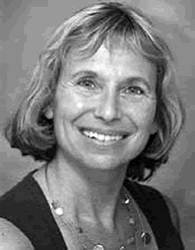
Fania Oz-Salzberger ; Fania Oz-Salzberger, a professor at Haifa and Monash universities, is currently a Laurance S. Rockefeller visiting professor for distinguished teaching at Princeton.
Fania Oz-Salzberger - School of Philosophical, Historical and International Studies
Position
Professor to the Leon Liberman Chair of Modern Israel Studies
Email
fania.oz-salzberger@arts.monash.edu.au
Phone
+61 3 9902 9942
Address
School of Philosophical, Historical and International Studies
Australian Centre for Jewish Civilisation
Building 11
Monash University Victoria 3800
Australia
